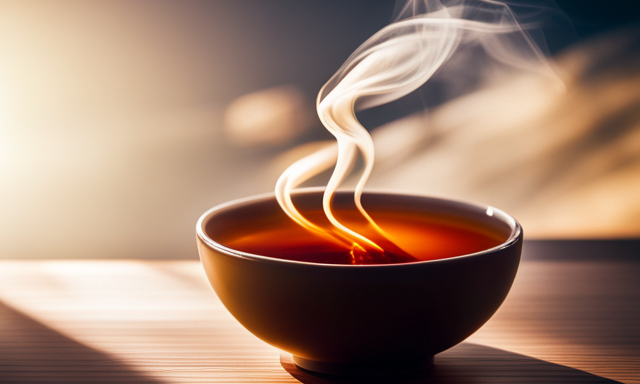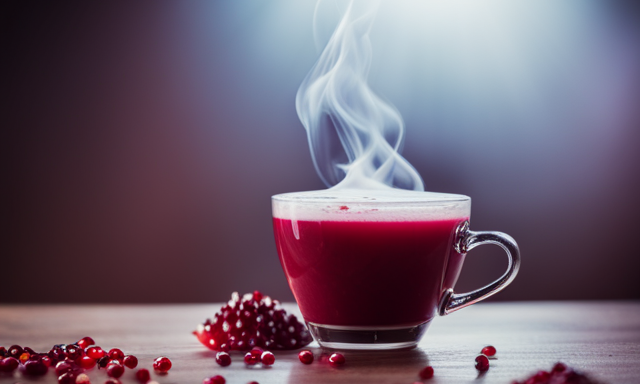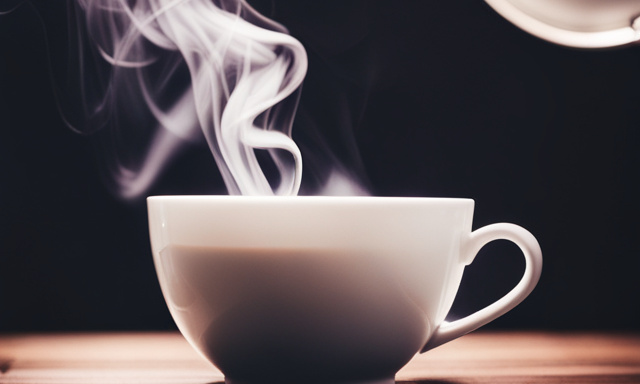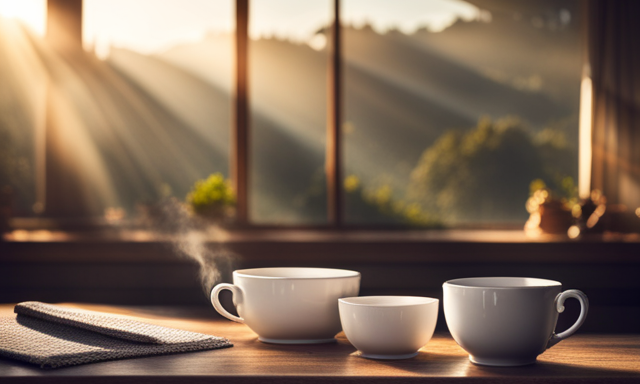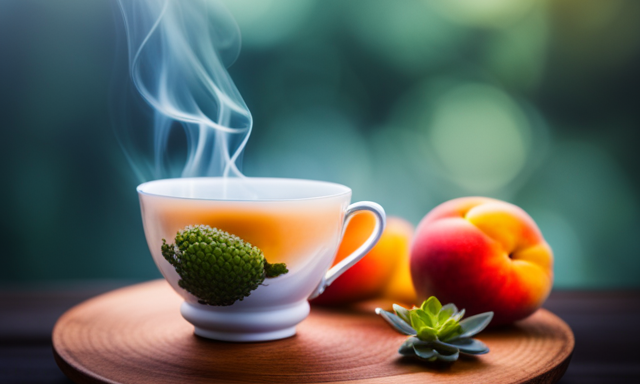Did you know that oolong tea is not only delicious but also contains caffeine? In fact, oolong tea has a moderate amount of caffeine compared to other types of tea.
As someone who enjoys a cup of tea to start my day, I was curious to learn more about the caffeine content in oolong tea. In this article, I will explore the origins of oolong tea, what makes it unique, and most importantly, how much caffeine you can expect to find in a cup of this tea.
I will also discuss the factors that can affect caffeine levels in oolong tea and provide tips on managing your caffeine intake.
So, if you’re a tea lover like me and want to know more about the caffeine content in oolong tea, keep reading!
Key Takeaways
- Oolong tea has a moderate caffeine content, falling between levels of black tea and green tea.
- The average caffeine content in oolong tea is 37-55 mg per 8-ounce serving.
- Steeping time affects the caffeine levels in oolong tea.
- Oolong tea contains less caffeine compared to black tea.
The Origins of Oolong Tea
Let’s dive into the fascinating origins of oolong tea and discover the rich history behind this delightful beverage!
Oolong tea originated in China during the Ming Dynasty and has been enjoyed for centuries. Its cultivation techniques have been perfected over time, with skilled tea masters carefully harvesting the leaves and using specific methods to oxidize and semi-ferment them.
This unique process gives oolong tea its distinctive flavor and aroma. The tea leaves are withered, rolled, and dried to create a complex and balanced brew. What makes oolong tea unique is its partial fermentation, which falls between green and black teas.
This results in a taste profile that is both floral and fruity, with a hint of sweetness. Now that we know about its origins and cultivation techniques, let’s explore what makes oolong tea truly special.
What Makes Oolong Tea Unique
Oolong tea stands out for its exceptional flavor and a distinctive combination of characteristics that set it apart from other beverages. When it comes to taste, oolong tea offers a delightful balance between the rich, robust flavors of black tea and the delicate, floral notes of green tea. This makes it a unique and enjoyable choice for tea enthusiasts.
What sets oolong tea apart from other teas is the way it is processed. Oolong tea undergoes a partial oxidation process, which gives it its distinctive flavor profile. This process involves withering the leaves under the sun, then bruising and oxidizing them before they are heat-treated to stop the oxidation. This meticulous process results in a complex and layered taste that is truly one-of-a-kind.
In addition to its enticing taste, oolong tea also offers a range of health benefits, including boosting metabolism and aiding in weight management. Its unique combination of polyphenols and antioxidants make it a popular choice among those seeking a healthier lifestyle.
Moving on to the next section about caffeine content in oolong tea compared to other teas, oolong tea offers a moderate caffeine content that falls between the levels found in black tea and green tea.
Caffeine Content in Oolong Tea compared to Other Teas
Contrary to what you might expect, oolong tea has a caffeine content that falls between the levels found in black tea and green tea, giving you a satisfying jolt without the jitters. The caffeine content among different oolong tea varieties can vary, but on average, it ranges from 37 to 55 milligrams per 8-ounce serving. Steeping time also plays a role in the caffeine levels of oolong tea. The longer you steep the tea, the higher the caffeine content will be. However, even with a longer steeping time, oolong tea still contains less caffeine compared to black tea. To illustrate the caffeine content in various teas, here is a table:
| Tea Type | Caffeine Content (mg) |
|---|---|
| Oolong | 37-55 |
| Green | 20-45 |
| Black | 47-90 |
Understanding the caffeine content in oolong tea and how it compares to other teas is essential in choosing the right tea for your needs. In the following section, we will explore the factors that affect caffeine levels in oolong tea.
Factors that Affect Caffeine Levels in Oolong Tea
Factors that affect caffeine levels in oolong tea include steeping time, tea variety, serving size, and the impact of processing.
-
Steeping time: The longer you steep the tea, the higher the caffeine content.
-
Tea variety: Different varieties of oolong tea have varying caffeine levels.
-
Serving size: Larger servings of oolong tea will contain more caffeine.
-
Impact of processing: The way oolong tea is processed can affect its caffeine content.
Understanding these factors can help you make informed choices about your oolong tea consumption. Now, let’s move on to the next section and explore the health benefits of oolong tea.
Health Benefits of Oolong Tea
Get ready to experience a refreshing sip that will leave you feeling rejuvenated and ready to conquer the day: oolong tea offers a plethora of health benefits!
One of the most notable advantages is its potential for aiding in weight loss. Oolong tea contains compounds known as polyphenols, which have been shown to boost metabolism and increase fat oxidation. Research suggests that regularly consuming oolong tea may help with weight management and contribute to a healthier body composition.
Additionally, oolong tea is rich in antioxidants, which can help protect against oxidative stress and reduce the risk of chronic diseases such as heart disease and cancer.
So, grab a cup of oolong tea and start reaping the health benefits it has to offer. Now, let’s dive into how to brew the perfect cup of oolong tea.
How to Brew the Perfect Cup of Oolong Tea
Brewing the perfect cup of oolong tea is like conducting a delicate symphony of flavors and aromas that will transport you to a tranquil oasis.
To achieve this harmonious blend, it is important to pay attention to brewing techniques and the quality of tea leaves used.
Oolong tea requires a specific water temperature and steeping time to bring out its unique characteristics. Generally, it is recommended to steep oolong tea leaves in water that is around 190-200°F for 3-5 minutes. This allows the leaves to unfurl and release their complex flavors.
Some enthusiasts prefer multiple infusions to fully savor the nuances of oolong tea.
As we delve into caffeine sensitivity and oolong tea, it’s important to understand the intricacies of brewing this exquisite beverage.
Caffeine Sensitivity and Oolong Tea
When it comes to enjoying a cup of oolong, it’s crucial to consider your sensitivity to caffeine. Caffeine sensitivity varies among individuals, and it can have consequences for those who are more sensitive. Oolong tea contains caffeine, which is a stimulant that can affect sleep quality. For individuals who are highly sensitive to caffeine, consuming oolong tea in the evening may lead to difficulty falling asleep or disrupted sleep patterns. To better understand the caffeine content in oolong tea and its potential effects on sleep, let’s take a look at the following table:
| Oolong Tea Type | Caffeine Content (per 8 oz cup) |
|---|---|
| Light | 30-50 mg |
| Medium | 40-60 mg |
| Dark | 50-75 mg |
By being aware of your caffeine sensitivity and the caffeine content in different types of oolong tea, you can make informed choices about when and how much oolong tea to consume. This knowledge will be helpful when we discuss tips for managing caffeine intake with oolong tea.
Tips for Managing Caffeine Intake with Oolong Tea
To effectively control your caffeine consumption while enjoying oolong tea, it’s important to find a balance between your sensitivity and the type of oolong you choose. If you’re sensitive to caffeine or trying to reduce your intake, start with a lower-caffeine oolong variety, such as lightly oxidized ones. These types generally have lower caffeine content compared to heavily oxidized oolongs.
You can also gradually decrease your oolong tea consumption or opt for shorter steeping times to further reduce caffeine intake. If you’re managing caffeine withdrawal symptoms, incorporating oolong tea into a healthy diet can be beneficial due to its various health benefits and potential calming effects. However, it’s essential to listen to your body and adjust your oolong tea consumption accordingly.
Transitioning into the subsequent section about ‘other factors to consider when choosing oolong tea,’ it’s important to also consider the quality, flavor, and origin of the oolong tea you choose.
Other Factors to Consider When Choosing Oolong Tea
If you want an extraordinary and unforgettable tea-drinking experience, exploring the unique and diverse flavors of oolong teas from different regions is an absolute must. Oolong tea is known for its wide range of flavor profiles, which can vary from light and floral to rich and roasted. The flavor of oolong tea is influenced by various factors, including the region it is grown in, the altitude, and the processing methods. To give you an idea of the flavor profiles of different oolong teas, here is a table showcasing three popular varieties:
| Variety | Flavor Profile | Brewing Technique |
|---|---|---|
| Tie Guan Yin | Floral, Orchid, Fruity | Gongfu Cha |
| Da Hong Pao | Roasted, Nutty, Smoky | Traditional |
| Oriental Beauty | Honey, Fruity, Sweet | Western |
By understanding the different flavor profiles and brewing techniques, you can tailor your oolong tea experience to suit your preferences. Learning about these factors will help you appreciate and enjoy the flavor and benefits of oolong tea even more.
Enjoying the Flavor and Benefits of Oolong Tea
Savoring the exquisite taste and reaping the numerous health benefits, oolong tea proves to be a delightful addition to any tea lover’s repertoire.
Oolong tea offers a wide range of flavor profiles, from floral and fruity to woody and roasted. The flavor can vary depending on the type of oolong tea and the way it is processed.
To fully enjoy the unique flavors, it is important to use proper brewing techniques. Start by using fresh, filtered water heated to around 190-200°F. Steep the leaves for 2-3 minutes for a lighter flavor or 4-5 minutes for a stronger brew.
Experiment with different steeping times and water temperatures to find your preferred taste. By paying attention to flavor profiles and brewing techniques, you can fully appreciate the rich and diverse flavors of oolong tea.
Frequently Asked Questions
Can oolong tea help with weight loss?
Oolong tea can potentially aid weight loss due to its metabolism-boosting properties and ability to help regulate blood sugar levels. Incorporating oolong tea into a balanced diet and exercise routine can be beneficial for weight management.
Is oolong tea safe for pregnant women?
Oolong tea is generally considered safe for pregnant women when consumed in moderation. However, it’s always best to consult with a healthcare provider to ensure it aligns with your specific pregnancy needs.
Does oolong tea have any side effects?
Oolong tea can have positive effects on heart health and digestion. However, some potential side effects include caffeine sensitivity, sleep disturbances, and gastrointestinal issues. It is important to consume oolong tea in moderation.
How should oolong tea be stored to maintain its freshness?
To maintain the freshness of oolong tea, store it in an airtight container away from light, heat, and moisture. This helps preserve its flavor and aroma, ensuring a delightful tea-drinking experience.
Can oolong tea be consumed cold or iced?
Yes, oolong tea can be consumed cold or iced. While hot oolong tea is great for enjoying its full flavors, iced oolong tea offers a refreshing and hydrating option. It can also provide benefits like improved digestion and increased metabolism.
Conclusion
In conclusion, oolong tea is a unique beverage that offers a range of health benefits.
With its moderate caffeine content, oolong tea provides a gentle energy boost without the jitters or crashes associated with other caffeinated drinks.
Interestingly, studies have shown that oolong tea contains approximately 37 mg of caffeine per 8-ounce cup, which is significantly lower than the caffeine content in black tea or coffee.
This makes oolong tea a great choice for individuals looking to manage their caffeine intake while enjoying the flavor and benefits of this delightful tea.

